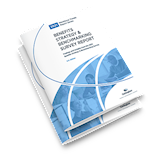
The pandemic has hit almost every organisation and Asset Management firms are not exempt. They too are seeing the need to reprioritise and reorganise, in order to survive in this evolving environment, particularly when it comes to total reward. Unsurprisingly and in line with most other organisations, communication has been the top priority, closely followed by support for home working according to Gallagher’s 2021 Benefits Strategy & Benchmarking Report. Just under a third of these organisations have also added new health and wellbeing benefits to their employee offering.
A massive 97% of organisations offer some form of company funded private medical insurance and all organisations in this sector, provide coverage to all employee categories. Most employee categories are also likely to receive family cover funded by the employer.
In line with this over 90% of Asset Management organisations surveyed offer Life Assurance and LTD / Income Protection to all employees, which is up on last year. However, Critical Illness cover is not prevalent as an employer funded benefit and is only found in around 20% of the respondent organisations.
With this in mind it is not surprising that only 38% of respondent organisations in this sector offer contractual sick pay i.e. sick pay provision as a contractual entitlement, over and above the statutory minimum. The majority, however, still provide only discretionary sick pay above statutory.
44% of organisations are providing sick pay at a higher rate or at a higher frequency than statutory sick pay on an entirely discretionary basis. In other words, management determine whether or not to provide additional sick pay based on the individual circumstances of any particular sickness absence.
Although flexible working is becoming much more popular with the organisations surveyed, this is not necessarily the case across the sector. Many of our clients are now back to five days per week in the office and some big organisations in this sector, namely the big banks, have encouraged people back to the office.
Although 88% of the organisations have not reviewed their leave policies in light of the pandemic, annual leave build up has become an issue for many in this sector. Most have taken a standard approach of communicating the need to take holiday and have a rest from work. 44% have restricted the carry-over of leave and 20% have enforced holiday to be taken.
Family leave is very topical at the moment and our research shows this has improved since last year. We are also seeing a range of new and different types of leave emerging over the last few years, with 97% of organisations offering some sort of ‘other’ leave not covered in family leave. This diverse range of additional leave shows how employers are looking to offer a variety of things to appeal to all employees, they include:
- Bereavement/compassionate leave offered by 9 out of 10 organisations.
- Study leave is common and found in 64% of organisations.
- Volunteering leave is found in a quarter or organisations.
It is great that health and wellbeing are being dealt with, but what about the financial support for employees. 85% of organisations in the Asset Management sector offer Retirement Savings in excess of the current statutory minimum, which is up from 82% last year and all participants from this sector have a Defined Contribution scheme in place.
A massive 66% of respondent organisations in this sector have adopted a formal ESG strategy, which is much higher than other sectors. Of those that have adopted an ESG strategy, only 10% have applied this in relation to their pension fund investment approach, and related communications to employees. This is a surprising figure considering the number of Asset Management organisations providing retirement savings.


